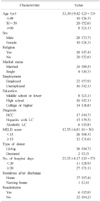Abstract
Background
This study was conducted to develop a pre-discharge group education program for liver transplant patients, and to contribute to improving the knowledge and performance of self-management after discharge.
Methods
This investigation was a methodological study consisting of analysis, design, development, operation, and evaluation stages.
Results
The constituent items of the pre-discharge group education program for liver transplant patients include medication management, infection management, emergency management, outpatient management, complication management, nutrition management, exercise management, wound and drainage management, disability registration, and sex life. The pre-discharge group education program for liver transplant patients was conducted once a week, 30 minutes for the coordinator, 40 minutes for the clinical nurse specialist (including 10 minutes for wound and drainage management), 30 minutes for pharmacists, 20 minutes for the nutritionist, and 20 minutes for social workers. Additionally, the contents of the lecture announced by PowerPoint were made the same as the booklet. The overall knowledge level before and 3 months after the pre-discharge group education program for liver transplantation patients increased significantly from 17.32±1.53 to 19.74±0.89. At the 3-month time point, the overall compliance was 77.39±3.04 out of 80. Overall satisfaction was 9.32±0.93 on a scale of 10. Finally, the need for medication was the highest at 3 months.
Figures and Tables
Table 1
The content validity of the experts on the pre-discharge group education program for liver transplant patients (n=10)

References
1. Yilmaz TU. Importance of education in organ donation. Exp Clin Transplant. 2011; 9:370–375.
2. Korea Network for Organ Sharing (KONOS). Statistical yearbook [Internet]. Seoul: KONOS;c2014. cited 2017 Feb 24. Available from: https://www.konos.go.kr/konosis/index.jsp.
3. Ko DM. Liver transplant recipients' information according to the time elapsed since liver transplant [master's thesis]. Seoul, KR: Seoul National University;2012.
4. Bae HO, Suh SR. Effect of structured information provided on knowledge and self care behavior of liver cirrhosis patients. J Korean Acad Adult Nurs. 2001; 13:476–485.
5. Sim MK, Son SY. The effects of an individual educational program on self-care knowledge and self-care behavior in kidney transplantation patients. J East West Nurs Res. 2012; 18:9–17.
6. Urstad KH, Oyen O, Andersen MH, Moum T, Wahl AK. The effect of an educational intervention for renal recipients: a randomized controlled trial. Clin Transplant. 2012; 26:E246–E253.

7. Jeong HC. The effect of in-patient guide movie and booklet programs on understanding of hospital life and satisfaction with the programs. J Korean Acad Nurs Adm. 2008; 14:45–50.
8. Shepperd S, McClaran J, Phillips CO, Lannin NA, Clemson LM, McCluskey A, et al. Discharge planning from hospital to home. Cochrane Database Syst Rev. 2010; (1):CD000313.

9. Lee JE. Study of discharge education about the liver transplantation patients : the learning need & patients's comprehension [master's thesis]. Seoul, KR: Ewha Womans University;2004.
10. Polit DF, Beck CT. The content validity index: are you sure you know what's being reported? Critique and recommendations. Res Nurs Health. 2006; 29:489–497.

11. Coey L. Readability of printed educational materials used to inform potential and actual ostomates. J Clin Nurs. 1996; 5:359–366.

12. Jung YY. The development of a internet-based computer assisted instruction program and analysis of its educational effects on patients with coronary artery disease [dissertation]. Seoul, KR: Seoul National University;2002.
13. Samoocha D, Bruinvels DJ, Elbers NA, Anema JR, van der Beek AJ. Effectiveness of web-based interventions on patient empowerment: a systematic review and meta-analysis. J Med Internet Res. 2010; 12:e23.

14. Kim KS, Han YJ, Lee SH. Study on the factors affecting the learning effect of web-based distance education systems. J Bus Res. 2003; 18:195–218.
15. Yoo YS, Cho OH, Park SK, Jung HS, Kim SI. Development of a Web-based hypertensive patient management system using short message service (SMS): pilot study. Clin Nurs Res. 2005; 11:57–70.
16. Kim HS. Effects of web-based diabetic education in obese diabetic patients. J Korean Acad Nurs. 2005; 35:924–930.

17. Lee NY, Kim YH. Development and evaluation of an e-learning program for mothers of premature infants. J Korean Acad Nurs. 2008; 38:152–160.

18. Oh JA, Kim HS, Park MJ, Shim HS. Effects of web-based health education on blood glucose and blood pressure improvement in postmenopausal women with impaired fasting blood glucose. J Korean Acad Nurs. 2011; 41:724–731.

19. Kim CG, Park HA. Development and evaluation of a web-based education program to prevent secondary stroke. J Korean Acad Nurs. 2011; 41:47–60.

20. Wang HJ, Kim IO. Effects of a mobile web-based pregnancy health care educational program for mothers at an advanced maternal age. J Korean Acad Nurs. 2015; 45:337–346.

21. Lee HJ. Effect of individual health education the medical clinic of public health centers on knowledge, self-efficacy, and self-care behavior in clients with hypertension. J Korean Public Health Nurs. 2004; 18:80–89.
22. Heo J, Kim S, Kim JH, Huh S. Effect of patient's satisfaction with pharmacist's medication counseling on medication compliance among outpatients. Korean J Clin Pharm. 2009; 19:110–119.




 PDF
PDF ePub
ePub Citation
Citation Print
Print






 XML Download
XML Download